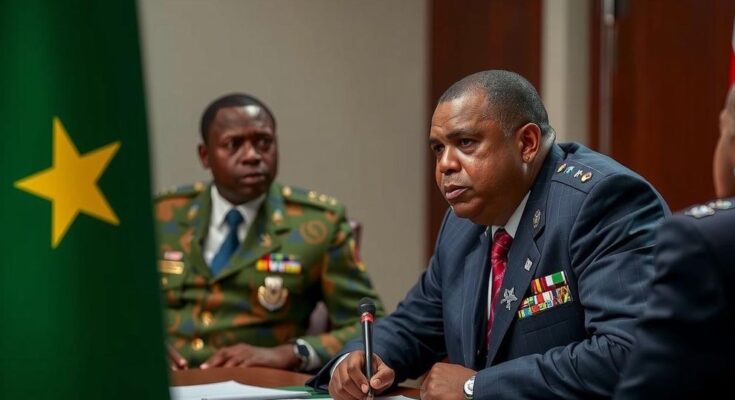South Sudan President Salva Kiir held an emergency meeting regarding a shootout at former spy chief Akol Koor’s home. The incident, viewed as a misunderstanding among security forces, resulted in the deaths of four individuals. Despite the chaos, normal traffic has resumed in the area, though police remain cautious. The event underscores ongoing political instability in South Sudan as the nation grapples with economic crises and social unrest.
On Friday, President Salva Kiir of South Sudan convened a critical meeting with senior security officials following a shootout near the residence of Akol Koor, a former spy chief. Koor, dismissed almost two months prior amid accusations of a coup attempt, experienced gunfire at his home in Juba, resulting in significant public alarm. According to the South Sudan People’s Defence Forces spokesman, the incident arose from a “misunderstanding” among security details escorting Koor.
After initial chaos, authorities stated that Koor would be relocated under army protection but was not considered to be detained. Tragically, the armed confrontation resulted in the deaths of four individuals, identified as two soldiers and two civilians. Despite increased military presence, normalcy has without delay resumed in surrounding areas, although police advised local residents to stay vigilant.
Koor had previously held the position of head of the National Security Services since the country’s independence in 2011, until his recent dismissal which fueled speculation regarding potential dissent against the president. The context of political instability further compounds the situation as South Sudan faces ongoing economic challenges and social unrest. The international community continues to press for advancements in a transitional process towards democracy, which includes uniting rival military factions and constitutional reforms.
The incident involving former National Security Services head Akol Koor underscores the ongoing governance challenges faced by South Sudan, the youngest nation in the world. Following a devastating civil war between forces loyal to President Kiir and Riek Machar from 2013 to 2018, South Sudan is struggling with political divisions and serious humanitarian issues. Koor’s dismissal from a powerful position and the subsequent violence highlight the fragility of the nation’s political climate and the potential for escalation in civil unrest. The international community is closely observing the situation amidst calls for democratic elections and stabilization efforts.
In conclusion, President Salva Kiir’s meeting with security officials following the violent incident at Akol Koor’s residence reflects the heightened tensions within South Sudan’s political landscape. The response to the shooting as well as the previous dismissal of Koor points to a broader context of instability and power struggles that continues to affect the country’s progress. Moving forward, ensuring stability and security will be critical for South Sudan to navigate its complex political challenges and fulfill its commitment to democratic processes.
Original Source: www.iosconews.com




